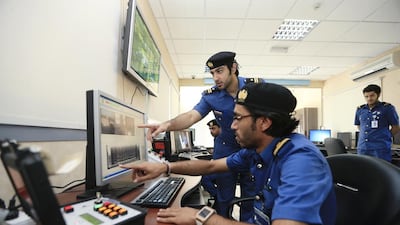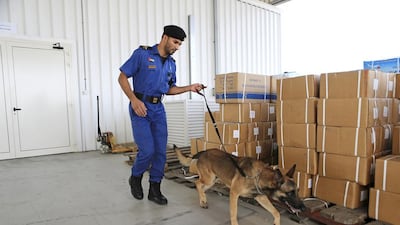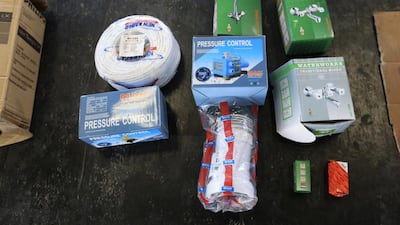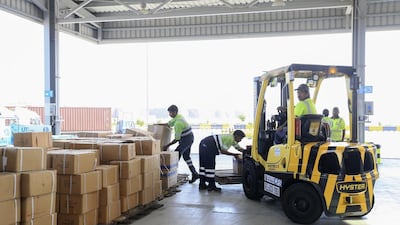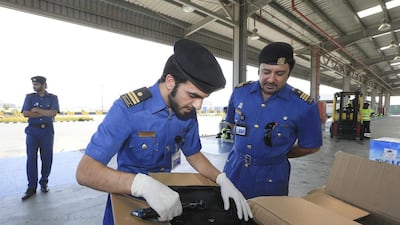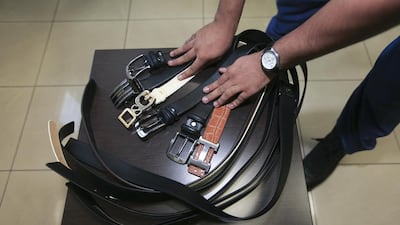Heroin hidden in wheelchairs, vape pods containing CBD oil, LSD-laced stamps, marijuana concealed in crisp packets and gold woven into clothes. These were among the most bizarre seizures made by customs officers at Dubai International Airport this year.
Officials made 131 seizures while processing more than two million passengers and four million bags during the first three months of 2021.
Attempts to smuggle nearly 56kg of drugs were foiled, with cocaine, heroin and marijuana among the substances seized. A total of 3,950 illegal pills were also found.
Dubai customs
Every day, customs officers observe passengers’ behaviour and body language to profile suspects. Passengers are then searched using advanced equipment to identify suspicious objects.
Methods used to conceal goods have become more ingenious, said senior inspection officer Faisal Al Shurafa.
“Contraband has been hidden in food boxes, wheelchairs, wigs, almonds, spices, oil bottles and honey jars,” said Mr Al Shurafa, who has been with Dubai Customs for 14 years.
Occasionally, those bringing in illegal items will hide them underneath religious books.
“This is to give inspectors an impression they are God-fearing people who wouldn’t smuggle illegal items,” he said.
Mr Al Shurafa recalled a case in which a passenger had not been pulled aside to be searched. Instead he confessed upon seeing the customs officers in uniform.
“He willingly approached us and handed a small amount of drugs he brought for personal use.”
Mr Al Shurafa explained that having seen his fair share of smuggling attempts over the years, the number one method is hiding contraband inside luggage, followed by concealing it inside passengers’ bodies.
“The strangest so far was the drugs concealed in hollowed out almonds,” he said.
“Almond bags were the only items inside the passenger’s bags. When our colleague held one almond it cracked in his hand and he discovered the drugs.”
“Criminals never stop getting more creative with their methods for smuggling, but we also continue to train so that no method is too hard for us,” Mr Al Shurafa said.
Another passenger was arriving on holiday with his family and had packed large amounts of drugs to sell while in Dubai.
“The funny part about this case is that his wife told us all about his illegal activity smuggling and selling drugs.”
Officials say that when reading body language, it is important to focus on the eyes.
“If doing something illegal, the eyes will give one away and when we see that, we start focusing on movements that are out of place, like cracking fingers or such,” he said.
Passengers will then be approached and politely questioned.
“We ask normal questions, like ‘How are you?’ and ‘How was your trip?’, but we can tell if something is not right from the way a person answers.”
“It’s a huge challenge because given the number of passengers, I have only five seconds to detect suspicious individuals.”
Inspector Zaid Ali Al Shehhi, 28, specialises in detecting smuggled gold. He said sometimes people will declare it in the hope they will not be searched.
Mr Al Shehhi has also caught travellers hiding gold inside bottles, melting it into strips and wrapping it around their bodies or sewing it into their clothes.
“One passenger wrapped around one kilogram of molten gold around his body.”
Officers receive a lot of training on the types of drugs and illegal materials that might be smuggled into the country, and the various methods that criminals might use to evade detection.
“They are trained on how to use advanced equipment, read body language, analyse data and tell original products from fake ones,” said Khamees Al Muhairi, senior manager of Dubai Customs’ learning department.
Last year, customs officers underwent 8,994 hours of training and took 158 online courses.
